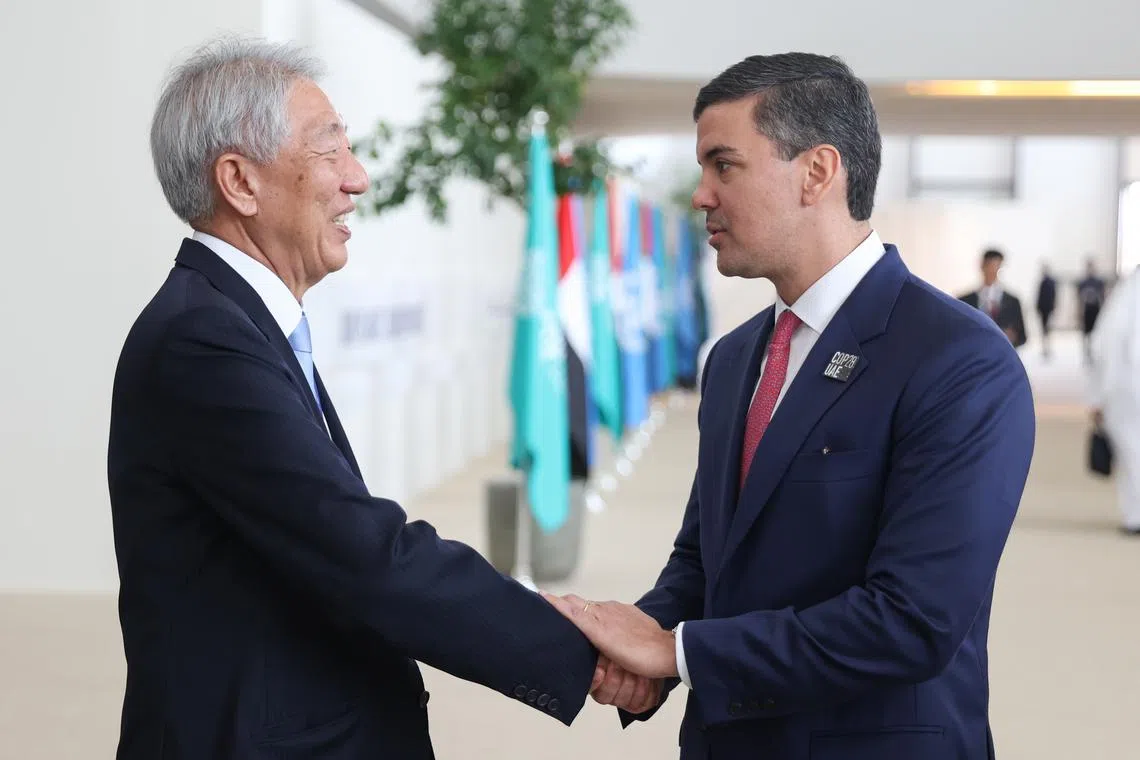S’pore close to signing agreements with Bhutan, Paraguay allowing bilateral carbon credit trade
Sign up now: Get ST's newsletters delivered to your inbox

The announcement comes after Paraguayan President Santiago Pena and Senior Minister Teo Chee Hean met on the sidelines of COP28.
PHOTO: MCI
DUBAI – Singapore is a step closer to signing agreements with Bhutan and Paraguay that would allow companies in the Republic to purchase carbon credits from projects in these countries to offset part of their carbon tax.
The deal with Bhutan, if it comes through, will be the first agreement that Singapore signs with a carbon-negative country. Bhutan absorbs more carbon dioxide (CO2) than it produces as more than 70 per cent of its land surface is covered in forests.
The Ministry of Trade and Industry (MTI) said on Dec 4 that Singapore is committed to ensuring the integrity, quality and transparency of carbon markets, and that the collaboration will also prioritise sustainable development and co-benefits to Bhutan’s local communities and economy.
On the sidelines of COP28, MTI Deputy Secretary (Industry) Keith Tan met Mr Dasho Karma Tshering, Bhutan’s Secretary of the Ministry of Energy and Natural Resources, to reaffirm both countries’ commitment to advance global climate action.
Separately, Singapore and Paraguay will sign an agreement in early 2024 that would potentially be Paraguay’s first such agreement and the Republic’s first with a country in Latin America, Singapore’s National Climate Change Secretariat (NCCS) said on Dec 3.
The agreements will enable the bilateral transfer of carbon credits that is aligned with Article 6 of the Paris Agreement, which sets out the criteria and processes for carbon credit projects to be developed and traded.
The announcement comes after Paraguayan President Santiago Pena and Senior Minister and Coordinating Minister for National Security Teo Chee Hean met on the sidelines of the COP28 climate conference in Dubai.
Mr Teo said: “We are concluding negotiations on the implementation agreement which, when fully operationalised, will allow carbon credits to be traded between Singapore and Paraguay in line with the rulebook for Article 6 of the Paris Agreement.
“It underscores both countries’ belief in the potential of carbon markets to enable global climate ambition and achieve our climate targets through cooperation.”
Both countries will cooperate on a work programme to fully operationalise the implementation agreement, which can consist of exchanges of information and best practices, identification of potential projects, and mutual efforts to build capacities for Article 6 cooperation, said NCCS.
Paraguay’s Minister of Environment and Sustainable Development Rolando de Barros Barreto said: “We have laid the foundations for a bilateral agreement with the Republic of Singapore with the aim of advancing the country towards full sustainable development that benefits all Paraguayans.”
From 2024, Singapore’s carbon tax will increase from $5 per tonne currently to $25 per tonne.
After the agreement with Paraguay is in place, companies in Singapore will be able to purchase carbon credits from projects there to meet up to 5 per cent of their carbon tax obligations.
Singapore has also substantively concluded similar implementation agreements on carbon credits cooperation with Ghana and Vietnam.
In the meantime, Temasek-owned investment platform GenZero is working on a carbon project involving restoring about 100,000ha of degraded land in Ghana, and growing cocoa trees sustainably in shaded farms to shield these plantations from potentially damaging climate impacts such as floods, heat stress and pests.
Ghana has a rich, diverse forest ecosystem and productive agricultural land, but this has been threatened by deforestation arising from agricultural expansion and logging.
Therefore, embarking on nature-based solutions could help the country with reforestation and remove planet-warming CO2 from the atmosphere, which can generate carbon credits in the process.



